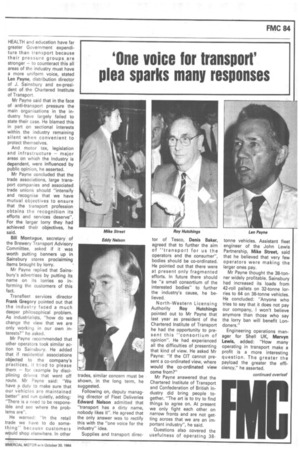'One voice for transport' plea sparks many responses
Page 37

If you've noticed an error in this article please click here to report it so we can fix it.
HEALTH and education have far greater Government expenditure than transport because their pressure groups are stronger — to counteract this all areas of the industry must have a more uniform voice, stated Len Payne, distribution director of J. Sainsbury and ex-president of the Chartered Institute of Transport.
Mr Payne said that in the face of anti-transport pressure the main organisations in the industry have largely failed to state their case. He blamed this in part on sectional interests within the industry remaining silent when convenient to protect themselves.
And motor tax, legislation and infrastructure — major areas on which the industry is dependent, were influenced by public opinion, he asserted.
Mr Payne concluded that the trade associations, large transport companies and associated trade unions should "intensify and recognise that we have mutual objectives to ensure that the transport profession obtains the recognition its efforts and services deserve". For the larger lorry they had achieved their objectives, he said.
Bill Montague, secretary of the Brewery Transport Advisory Committee, asked if it was worth putting banners up in Sainsbury stores proclaiming items brought by lorry.
Mr Payne replied that Sainsbury's advertises by putting its. name on its lorries so informing the customers of this fact.
Transfleet services director Frank Gregory pointed out that the industry faced a much deeper philosophical problem. As industrialists, "how do we change the view that we are only working in our own interests?" he asked.
Mr Payne recommended that other operators took similar action to Sainsbury. He added that if residential associations objected to the company's practices, it tried to please them — for example by disciplining drivers that went off route. Mr Payne said: "We have a duty to make sure that our vehicles are maintained better" and run quietly, adding: "There is a need to be responsible and see where the problems are".
He warned: "In the retail trade we have to do something" because customers would shop elsewhere. In other
trades, similar concern must be shown, in the long term, he suggested.
Following on, deputy managing director of Fleet Deliveries Edward Nelson admitted that "transport has a dirty name, nobody likes it". He agreed that the only answer was to rectify this with the "one voice for the industry" idea.
Supplies and transport direc tor of Tesco, Denis Baker, agreed that to further the aim of "transport for us the operators and the consumer", bodies should be co-ordinated. He pointed out that there were at present only fragmented efforts. In future there should be "a small consortium of the interested bodies" to further the industry's cause, he believed.
North-Western Licensing
Authority Roy Hutchings pointed out to Mr Payne that last year as president of the Chartered Institute of Transport he had the opportunity to present this "consortium of opinion". He had experienced all the difficulties of presenting that kind of view. He asked Mr Payne: "If the CIT cannot present a co-ordinated view, where would the co-ordinated view come from?"
Mr Payne answered that the Chartered Institute of Transport and Confederation of British Industry did bring people together. "The art is to try to find things to agree on. At present we only fight each other on narrow fronts and are not getting across that we are an important industry", he said.
Questions also covered the usefulness of operating 38
tonne vehicles. Assistant fleet engineer of the John Lewis Partnership, Mike Street, said that he believed that very few operators were making the larger ones pay.
Mr Payne thought the 38-tonner widely profitable. Sainsbury had increased its loads from 42-roll pallets on 32-tonne lorries to 64 on 38-tonne vehicles. He concluded: "Anyone who tries to say that it does not pay our company, I won't believe anymore than those who say the lorry ban will benefit Londoners."
Engineering operations manager for Shell UK, Mervyn Lewis, added: "How many operating in transport make a profit is a more interesting question. The greater the payload the greater the efficiency," he asserted.
































































































































































































































